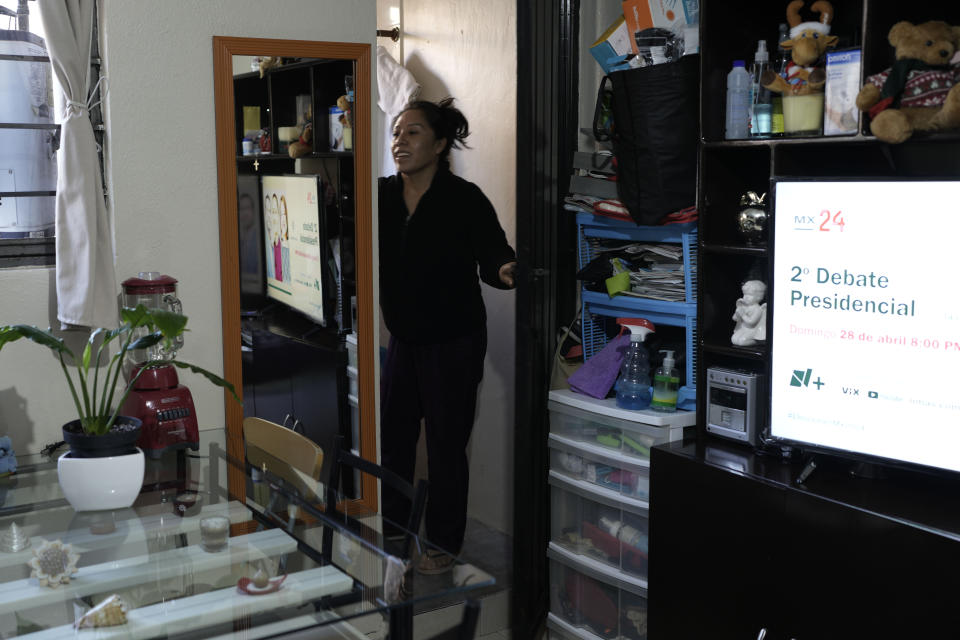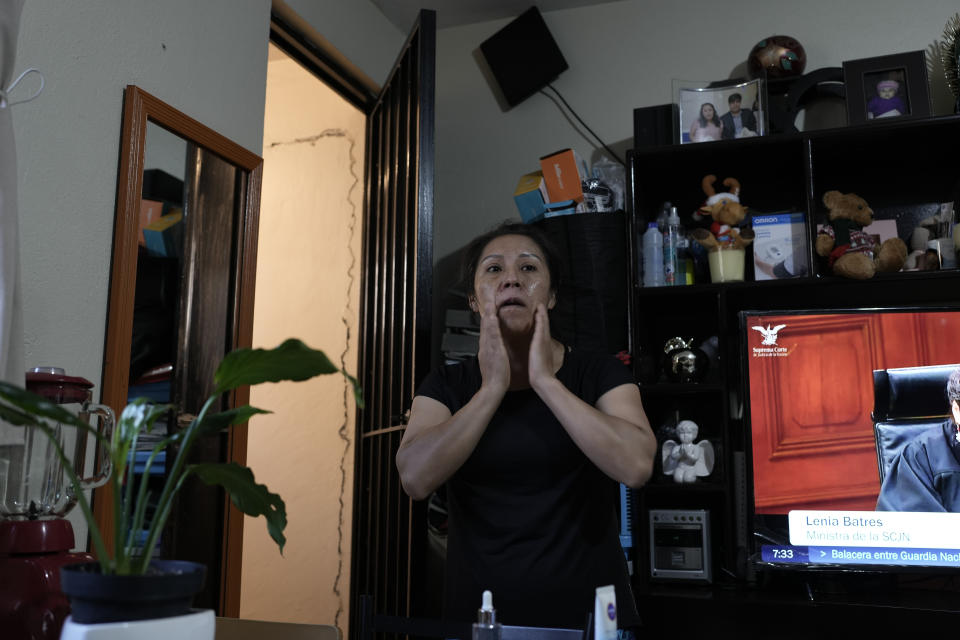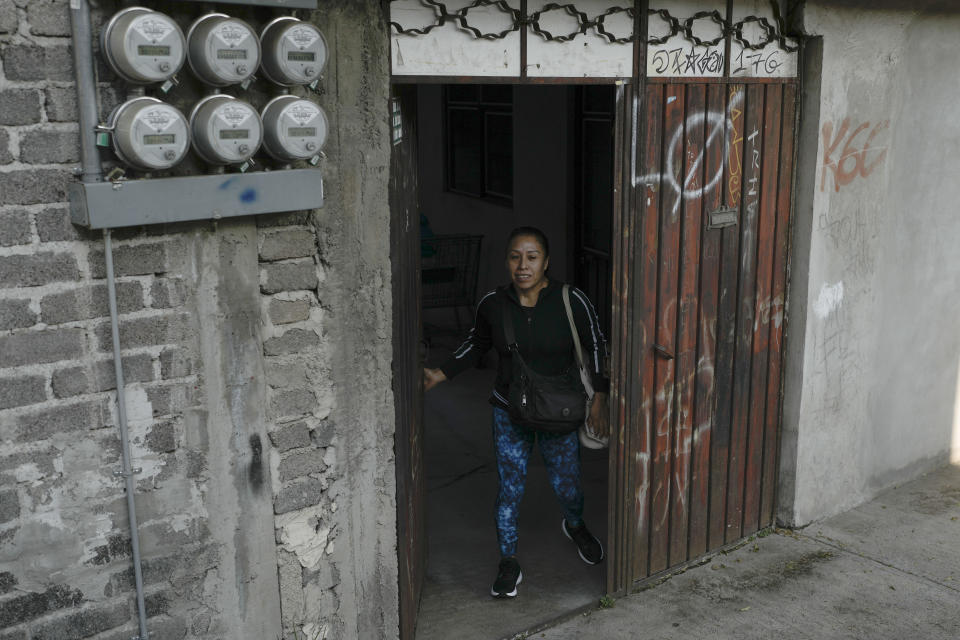A woman could be Mexico’s next leader. Millions of others continue in shadows as domestic workers.
- Oops!Something went wrong.Please try again later.
MEXICO CITY (AP) — Concepcion Alejo is used to being invisible.
Alejo, 43, touches her face up with makeup on a Tuesday morning, and steps out of her tiny apartment on the fringes of Mexico City. She walks until the cracked gravel outside her home turns into cobblestones, and the campaign posters coating small concrete buildings are replaced with the spotless walls of gated communities of the city’s upper class.
It’s here where Alejo has quietly worked cleaning the homes and raising the children of wealthier Mexicans for 26 years.
Alejo is among approximately 2.5 million Mexicans — largely women — who serve as domestic workers in the Latin American nation, a profession that has come to encapsulate gender and class divisions long permeating Mexico.
Women like her play a fundamental role in Mexican society, picking up the burden of domestic labor as a growing number of women professionals enter the workforce. Despite reforms under the current government, many domestic workers continue to face low pay, abuse by employers and long hours. It is an institution dating back to colonial times, and some researchers equate the unstable working conditions to “modern slavery.”
Now, with Mexico on its way to possibly electing its first female president June 2, domestic workers hope either former Mexico City Mayor Claudia Sheinbaum or former Sen. Xóchitl Gálvez might shift the balance in their favor.
“I’ve never voted all these years, because it’s always the same for us whoever wins. … When have they ever listened to us, why would I give them my vote?” Alejo said. “At least by having a woman, maybe things will be different.”
Born to a poor family in the central Mexican state of Puebla, Alejo dropped out of school at age 14, moving to Mexico City as a live-in nanny with two sisters.
“It’s like you’re a mother. The kids would call me ‘mama’,” she said. “I would bathe them, care for them, do everything from the moment I awoke to the moment they slept.”
While some domestic workers live separately from families, many more live with families and work weeks, if not months, without breaks and isolated from family and friends.
Alejo said the demands and low pay of domestic work led her not to have children herself. Others told The Associated Press they were fired from their positions after they fell ill and asked for help from their employers.
“When you work in someone else’s house, your life isn’t your own,” said Carolina Solana de Dios, a 47-year-old live-in nanny.
Their help is essential for working women like 49-year-old single mother Claudia Rodríguez, as they continue to fight to enter professional spaces historically dominated by men. In Mexico and much of Latin America, a gap has long divided men and women in the workplace. In 2005, 80% of men were employed or looking for jobs, compared to 40% of women, Mexican government data shows.
That gap has narrowed over time, though large disparities in salary and leadership roles still exist.
Born in a town two hours outside Mexico City, Rodríguez fled an abusive father with her mother and siblings, taking refuge in the capital. Instead of pursuing her dream of professionally dancing, she began to work and study not to “make the same sacrifice” as her mother toiling away in different informal jobs.
She spent years clawing her way up in the IT industry, but took over all the housework when she had kids with her husband. When her husband left her for another woman six years ago, hiring a live-in domestic worker was the only thing she could do to stay afloat.
Today, she and her nanny, Irma, both wake up at 5 a.m., one making lunch for her two daughters while the other drops them off at school.
“In the case of women in business, we couldn’t take it all on alone simply because it’s far too much that society expects of you,” she said.
Yet a historic number of Mexican women are taking up leadership roles, in part due gender quota laws set on political parties. Since 2018, Mexico’s Congress has had a 50-50 gender split, and the number of female governors has shot up.
While neither presidential candidate has spoken explicitly about domestic workers, both Sheinbaum and Gálvez proposed addressing violence against women and closing the country’s gender pay gap.
In 2019, the government of President Andrés Manuel López Obrador passed landmark legislation granting domestic workers basic rights like paid leave, limits on working hours and access to health insurance paid by employers.
But failures by the government to enforce those rules left domestic workers unprotected and locked in a “dynamic of power inequality,” said Norma Palacios, head of the country’s domestic workers union, SINACTRAHO.
“Nothing has changed … even if on paper we should have more labor rights,” Palacios said.
Neither Alejo, the domestic worker, nor Rodríguez, the single mother, say they particularly identify with either candidate on the ballot. Both plan to vote. Even if they see the leaders as more of the same, they echoed Palacios in saying that a woman leader would be an important step.
“It’s still a woman who is going to be at the head of a country — a sexist country, a country of inequality, a country of violence against women, a country of femicides,” Palacios said.
Meanwhile, workers like Alejo continue down a shaky path.
Alejo is among the 98% of domestic workers yet to enroll in health insurance, according to SINACTRAHO data.
She finally works with a kind family that pays her a fair wage, but she’s summoning up the courage to ask the family to pay for her health insurance, worrying that she’ll be replaced if she asks for her rights to be respected.
“They don’t like that you ask for things,” she said. “It’s not easy finding work, and if you need to work, you end up accepting whatever they give you.”





